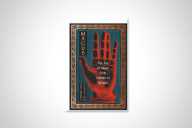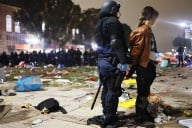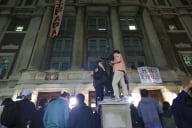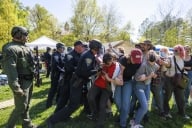You have /5 articles left.
Sign up for a free account or log in.
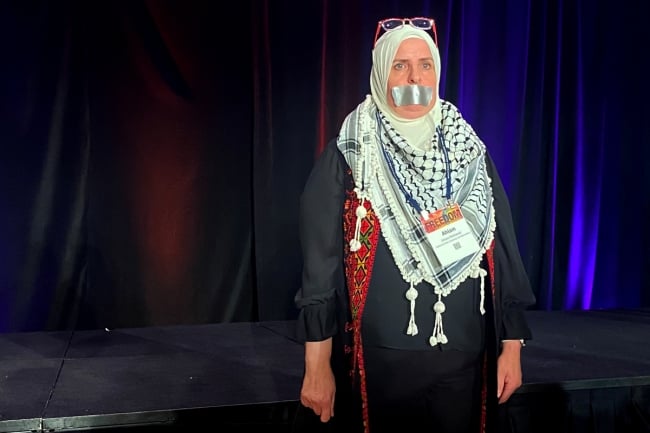
Ahlam Muhtaseb, professor of communication studies at California State University, San Bernardino, protesting the cancellation of her speech at last month’s National Communication Association conference.
Ahlam Muhtaseb
A Palestinian professor, whose speech at last month’s National Communication Association conference was canceled after she was told that association leaders objected to her calling the deaths in Gaza “genocide,” says she is again facing a familiar situation.
Once again, it involves at least one communications professional taking issue with Professor Ahlam Muhtaseb’s use of that charged term—but the pushback has now come from her own university. And, she says, she didn’t even use the word this time.
On Nov. 30, an “Inside CSUSB” email, containing a list of news and links regarding California State University, San Bernardino, went out to campus and the press, she said. Muhtaseb provided Inside Higher Ed the email, which contains this item about her:
“Professor of communication studies and award-winning film producer, Ahlam Muhtaseb, co-produced a new documentary, ‘36 Seconds: Portrait of a Hate Crime.’ The film was an official selection for DOC NYC 2023, America’s largest documentary film festival and an Academy Award–qualifying festival for short films, and the recipient of a Subject Matter grant.”
The next day, Muhtaseb emailed the university’s senior media relations specialist, asking why the item didn’t link to an article. She said there was supposed to be a story about the film and its global premiere.
That person’s boss—Robert C. Tenczar, associate vice president for strategic communication—responded to the professor last week.
“I am writing to you in my role as the chief administrator on campus for our official campus notifications and publicity,” Tenczar wrote. “The horrific events of October 7th and the ongoing bombing in Gaza and violence by settlers in the West Bank continue to be felt around the world.”
“Academic freedom—which includes the freedom of our faculty to discuss what has happened and is happening in the world—has been core to my values during my many decades in higher education,” he wrote. “However, I am also watching the polarizing rhetoric of the moment being used as excuses for violence, as we have seen in multiple bomb threats against Jewish synagogues in New York City and the shooting of three young Palestinian-American students in Vermont, resulting in one young man being paralyzed from the chest down as a result of that appalling act of violence.”
Tenczar wrote that he’s “therefore using, as my guidelines moving forward” for public statements and publicity, a Nov. 11 joint statement from the CSU system chancellor and the CSU system Board of Trustees chair. The statement doesn’t say the word “genocide” is banned from CSU public statements about what’s happening in Gaza, and it says, “the CSU steadfastly and unwaveringly supports the tenets of academic freedom and free speech.”
But that statement also says, “The CSU recognizes an additional responsibility. That is to have the courage and conviction to clearly denounce and challenge speech and behavior that reflect bias, hate, bigotry or intolerance or that contain misleading and untruthful assertions.”
Tenczar wrote to Muhtaseb, “Words are currently being used as weapons, and they are resulting in even more deaths, injury and terror here in the United States. The term ‘genocide,’ used as a descriptor for what is happening in Gaza right now, has become a flashpoint term, regardless of the user’s original intent, to imply and even provoke further violence. It is a word also viewed by many Jews around the world as anti-Semitic in this context. That is the reason why a link to your statement containing that word was not used in CSUSB’s publicity for your film. I also took this action with the intent of preventing a distraction from the actual film on which you have so ably served as co-producer and lead researcher.”
Tenczar, who is listed as the first media contact for the university, confirmed Monday he wrote the email but didn’t provide Inside Higher Ed an interview or further comment.
Last month, Muhtaseb was supposed to give a speech in Arabic as part of the National Communication Association president’s address at that organization’s 109th Annual Convention. Both Muhtaseb and the association’s president, Walid Afifi, are Palestinian, and Muhtaseb said she planned to use the word “genocide” to describe the deaths in Gaza during her part. She also planned to say, “Free Palestine.”
But, she said, Afifi informed her and other invited speakers shortly before the address was to start that the association would cancel the entire awards ceremony, during which the speeches were to be delivered, if she tried to give her part. All the speakers who were to take part in the address refused to participate if Muhtaseb couldn’t. The address was canceled and protest ensued, with attendees putting duct tape over their mouths and the planned speakers giving their speeches through a bullhorn in the conference hotel.
The National Communication Association’s Executive Committee subsequently apologized for the “censoring and dismissal.” It remains unclear who in that organization actually did the censoring.
In this latest instance, Muhtaseb said she doesn’t know why Tenczar brought up the term “genocide” again. In an email to Inside Higher Ed, she said an employee was supposed to write an article about the film, but Tenczar’s email suggests “they both were confused about the NCA issue and thought that the word ‘genocide’ was used in relation to my film story!”
“I personally was asking [the other communications employee] about the news story or news release that he was supposed to have written about the film’s global premier,” she wrote. “There is no connection between my new film, the premier, or the grant to genocide.”
She wrote to Tenczar that the fact that “you have made so basic a factual error gives me no confidence that your eager policing of my speech will even be accurate, much less nuanced.”
“If a group of White people decried criticism of the murder of George Floyd and the systemic racism in police departments across the country as ‘racist against White people,’” she wrote, “I rather doubt you would allow that objection to muzzle discussions of racist police practices. Jewish professors of Judaic and Hebrew Studies and Israeli Holocaust historians, trained in this academic area of study, have declaratively asserted that the events in Gaza constitute a genocide.”
Anita Levy, senior program officer in the Department of Academic Freedom, Tenure and Governance at the American Association of University Professors, called the situation “appalling.”
“Academic freedom and freedom of expression are essential to any institution of higher learning, and to have the institution itself participate in essentially censoring one of its own faculty members on the basis of their speech is very disturbing,” Levy said.

